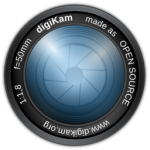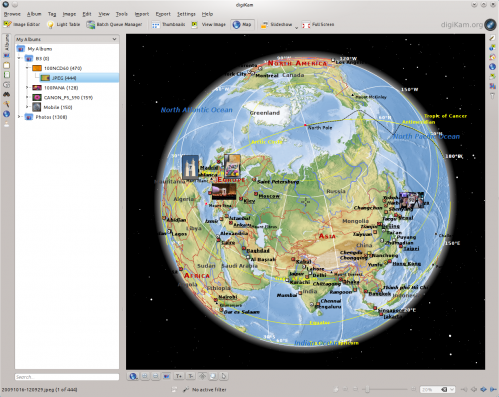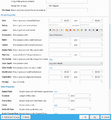Digikam/de: Difference between revisions
Updating to match new version of source page |
Updating to match new version of source page |
||
| Line 87: | Line 87: | ||
# To quickly adjust thumbnail size in the Album view, press and hold the <keycap>Ctrl</keycap> key, then use the mouse scroll wheel to make the thumbnails larger or smaller. | # To quickly adjust thumbnail size in the Album view, press and hold the <keycap>Ctrl</keycap> key, then use the mouse scroll wheel to make the thumbnails larger or smaller. | ||
# With the <menuchoice>Non-Destructive editing and Versioning</menuchoice> feature enabled, '''digiKam''' automatically hides originals and displays the latest modified versions of the photos. For example, if you process a NEF file and save it in the JPEG format, '''digiKam''' hides the original RAW file and shows only the JPEG photo. To disable this feature, choose <menuchoice>Settings -> Configure digiKam -> Editing Images</menuchoice> and make sure that the <menuchoice>Always show original images</menuchoice> option in the In main view section is enabled. To keep things tidy, you can then group the original and all its versions. To do this, select the photos you want to group, right-click on the selection, and choose <menuchoice>Group -> Group Selected Here</menuchoice>. | # With the <menuchoice>Non-Destructive editing and Versioning</menuchoice> feature enabled, '''digiKam''' automatically hides originals and displays the latest modified versions of the photos. For example, if you process a NEF file and save it in the JPEG format, '''digiKam''' hides the original RAW file and shows only the JPEG photo. To disable this feature, choose <menuchoice>Settings -> Configure digiKam -> Editing Images</menuchoice> and make sure that the <menuchoice>Always show original images</menuchoice> option in the '''In main view''' section is enabled. To keep things tidy, you can then group the original and all its versions. To do this, select the photos you want to group, right-click on the selection, and choose <menuchoice>Group -> Group Selected Here</menuchoice>. | ||
# {{Output|1=The trash has reached its maximum size! Cleanup the trash manually}} If you receive this error message and emptying the Trash doesn’t help, then the following command may solve the problem: {{Input|1=rm ~/.local/share/Trash/metadata}} | # {{Output|1=The trash has reached its maximum size! Cleanup the trash manually}} If you receive this error message and emptying the Trash doesn’t help, then the following command may solve the problem: {{Input|1=rm ~/.local/share/Trash/metadata}} | ||
# Need to quickly locate all untagged photos? In '''digiKam''', expand the <menuchoice>Search</menuchoice> left sidebar, and press the <menuchoice>Advanced Search</menuchoice> button. In the <menuchoice>Advanced Search</menuchoice> window, tick the <menuchoice>Not Tagged</menuchoice> check box and press <menuchoice>OK</menuchoice> to run the search. | # Need to quickly locate all untagged photos? In '''digiKam''', expand the <menuchoice>Search</menuchoice> left sidebar, and press the <menuchoice>Advanced Search</menuchoice> button. In the <menuchoice>Advanced Search</menuchoice> window, tick the <menuchoice>Not Tagged</menuchoice> check box and press <menuchoice>OK</menuchoice> to run the search. | ||
Revision as of 18:21, 30 September 2011
 |
Ansehen, verwalten, bearbeiten, verbessern, organisieren, etikettieren und veröffentlichen von Fotografien. |
Digikam unterstützt den Import von Fotos aus Kameras, Erstellung von Alben, Etikettieren mit Terminen, Themen und anderen Eigenschaften und bietet hervorragende Suchfunktionen. Bitte konsultieren Sie die Bedienungsanleitung für weitere Informationen, einschließlich der unterstützten Bild-Formate.
Verwalten Ihrer Fotos
-
Alben Anzeige
-
Kalender Anzeige
-
Anzeige der Exif-Informationen
-
Aufnahmeort lokalisieren
-
Suchergebnis Anzeige
-
Erweiterte Suche
-
Finden von Duplikaten
-
Fuzzy-Suche (Muster erkennen)
Der Foto Editor
-
Etikettieren
-
Zuweisen einer Bewertung
-
Anpassen der Farbanteile
-
Weißabgleich
-
Umwandeln in Schwarz-/Weiß-Fotos
-
Rote-Augen-Korrektur
-
Automatische Farbkorrektur
-
Automatische Linsenkorrektur
Die Kamera Schnittstelle
-
Lesen von Wechselmedien
-
oder von der Kamera
-
Speichern direkt in Alben
-
hinzufügen des Aufnahmeortes (Koordinaten) von einzelnen Fotos
Der Leuchttisch
-
aus einer Reihe von Fotos vergleichen
-
Details untersuchen
-
Bewertungen machen die Auswahl leichter
-
Siehe: Kamera-Einstellungen
ShowFoto
Für diejenigen, denen die digiKam-Oberfläche ein wenig zu technisch ist, bietet ShowFoto den Zugang zu den gleichen Werkzeugen mit einer populären Oberfläche.
-
Blättern
-
Bild-Eigenschaften
-
Siehe Bildeigenschaften
-
Koordinaten wieder
-
Preset zoomt
-
Histogramm
-
Allgemeine Einstellungen
-
Kurzhinweis-Optionen
-
Rohbild-Einstellungen
-
Farbverwaltungs-Einstellungen
-
Dateispeicher-Optionen
-
Konfigurieren einer Diaschau
Die Hilfe-Seite des Projektes hat Links zu Häufig gestellte Fragen (FAQs) und Details zum Abonnement von Mailing-Listen.
Es exisitiert eine kurze Videotour hier.
Der Abschnitt über Digital Asset Management ist nicht mehr auf den Web-Seiten, aber in der Anleitung, die in Ihrer Distribution im Paket 'digikam-doc' vorhanden sein kann, oder Sie können eine Reihe von '-Pdf'-Dateien herunterladen. digikam.pdf, showfoto.pdf und kipi-plugins.pdf
Der Blog Open Source Photo Processing Comes of Age von rm42 zeigt die Entwicklung von Digikam seit der KDE 3-Version und bietet eine Tour durch die Funktionen an.
Wir haben eine wachsende Sammlung von Anleitungen, die ihnen helfen mehr Freude und Produktivität von digikam zu erhalten. Die Digikam Anleitungs-Seite führt diese mit einer kurzen Beschreibung auf.
Useful digiKam Tricks
Transcribed from Dmitri Popov's blog, 26 September 2011
- To quickly adjust thumbnail size in the Album view, press and hold the Ctrl key, then use the mouse scroll wheel to make the thumbnails larger or smaller.
- With the feature enabled, digiKam automatically hides originals and displays the latest modified versions of the photos. For example, if you process a NEF file and save it in the JPEG format, digiKam hides the original RAW file and shows only the JPEG photo. To disable this feature, choose and make sure that the option in the In main view section is enabled. To keep things tidy, you can then group the original and all its versions. To do this, select the photos you want to group, right-click on the selection, and choose .
The trash has reached its maximum size! Cleanup the trash manually
If you receive this error message and emptying the Trash doesn’t help, then the following command may solve the problem:rm ~/.local/share/Trash/metadata
- Need to quickly locate all untagged photos? In digiKam, expand the left sidebar, and press the button. In the window, tick the check box and press to run the search.
- Instead of the conventional thumbnail view, digiKam lets you map your photos on a globe. Choose , and you should see photos from the current album mapped on the 3-D globe. You can then use the mouse to rotate the globe and the mouse wheel to zoom in and out. Obviously, the Map view displays only geotagged photos.






































